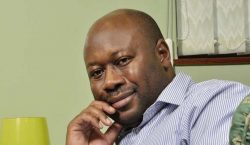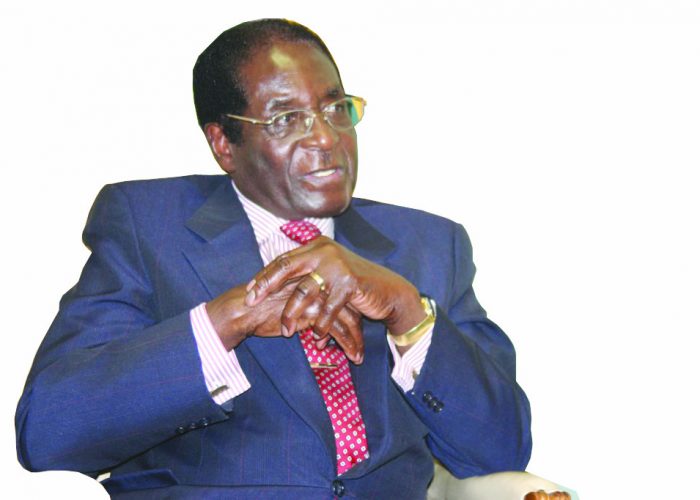


 PRESIDENT Robert Mugabe has sent the first clearest sign yet, signalling his intention to quit active politics possibly before the end of his five-year term by appointing an outright political Cabinet that blends the old guard with the young Turks, in what could be indicative of his desire for continuity, while also clearing the way for his successor, The Financial Gazette can report.
PRESIDENT Robert Mugabe has sent the first clearest sign yet, signalling his intention to quit active politics possibly before the end of his five-year term by appointing an outright political Cabinet that blends the old guard with the young Turks, in what could be indicative of his desire for continuity, while also clearing the way for his successor, The Financial Gazette can report.
President Mugabe has ruled Zimbabwe since 1980 when the country attained its independence from Britain and will be turning 94 in 2018, when the current term, his seventh, ends.
As had been expected, the veteran politician — buoyed by an overwhelming electoral victory at the July 31 polls — steered clear from rocking the boat, reposing his faith once more in trusted lieutenants who have been with him through thick and thin, some from as far back as the days of the liberation struggle that brought Zimbabwe’s independence.
While he made attempts to shrink his Cabinet from 33 members, during the days of the inclusive government, to 26, the Executive still remains too big for the size of Zimbabwe’s economy, whose Gross Domestic Product (GDP) has shrunk to slightly above US$5 billion from US$10 billion in 2000.
Of course, he had difficult choices to make considering that his ZANU-PF party secured an absolute majority in the National Assembly, giving him a wider pool of ministerial material to pick from.
Instead of bringing in technocrats, especially in the field of economics who could have been considered rank outsiders by party faithful, he appeared to have been swayed more by political considerations to avoid regrets in the twilight of his political career, with loyalty, tribal balancing and his succession being top on his mind.
With political considerations being the primary objective, the economy seems to be occupying a secondary role. Real growth could therefore remain a mirage unless there is an uncharacteristic shift from populist policies, which is unlikely, or if there is significant investment to be made by investors from friendly states such as Russia and China.
While the incoming Cabi-net’s commitment to serving its leader is quite apparent, of interest is the rising influence of Vice President Joice Mujuru. A number of individuals considered friendly to Mujuru were appointed to key ministries, possibly to shield her from her foes.
Where Mujuru’s rivals gained a fair share of the appointments, President Mugabe has made sure that those who made it are more loyal to him in order to keep them on a tight leash and avoid dividing his party.
Simon Khaya-Moyo, has bounced back into the fold as a senior Cabinet Minister, and nothing can stop him from ascending to the post of second vice-president left vacant following the death of John Nkomo in January.
For now, the country might continue to operate without a second Vice President until ZANU-PF has appointed one at its congress next year. Alternatively, the party might convene an extraordinary congress to deal with this matter or better still use the people’s conference in December to do the same.
While initial reports suggested the State Security portfolio had been dismantled to allow President Mugabe direct oversight to State Security matters, it later emerged these functions would be assigned to Presidetnial Affairs Minister, Didymus Mutasa, a Mujuru ally and President Mugabe’s confidante.
President Mugabe also ignored, totally, those from the opposition, putting paid to speculation that he would reach out to his rivals so as not to do away completely with the unity displayed during the troubled life of the inclusive government.
Arthur Mutambara, the outgoing Deputy Prime Minister, might however, be retained in the new government, possibly at the Planning Commission where he would be required to put his academic skills to good use by churning out economic prescriptions to move the country forward.
The inclusion of sharp tongued ZANU-PF members in his Cabinet, notably Jonathan Moyo, could be indicative of the faltering hope for successful re-engagement with the West, which has refused to recognise his administration since 2000, and the toughening of President Mugabe’s stance towards his nemesis.
Indications are that ZANU-PF could go for a bare-knuckled type of diplomacy with its perceived enemies and bring even closer its all-weather friends in the Far East.
Not much change is expected in terms of foreign policy. If anything, Zimbabwe’s stance towards the West could worsen as President Mugabe has hinted that his government could hit back, in response to the sanctions imposed on the ruling elite by the United States and the European Union (EU).
The biggest casualty would be the economy which is likely to remain stuck in the woods. Without the easing off of sanctions and clearance of bilateral passage with the West, there is little hope that the liquidity situation would ease.
Traditionally, Zimbabwe’s economy borrows heavily from European models, which explains why it was badly hurt by the imposition of sanctions.
President Mugabe has already hinted that the nation should brace for tougher times ahead in the wake of indications from the EU and the West that sanctions may remain in place.
President Mugabe’s appointments demonstrated that he would still be guided by a hawkish approach to international engagement particularly with the West, which he has accused of seeking regime change in Zimbabwe.
President Mugabe has been under international pressure for nearly 15 years since embarking on an agrarian reform that resulted in the expropriation of white-owned land for redistribution to blacks.
The reforms, largely chaotic, were triggered by former British prime minister Tony Blair who, through his then secretary of state for international development, Clare Short, infuriated President Mugabe after writing a letter to then minister of agriculture and lands, Kumbirai Kangai, who died last month, rejecting Britain’s colonial responsibility for land reform in Zimbabwe.
The letter sparked an angry response from President Mugabe who proceeded to expropriate white-owned farms under an exercise that turned violent and caused an international outcry.
The result was Zimbabwe’s isolation from the international community, which alleged human rights violations by President Mugabe’s government which battled for power against the Movement for Democratic Change (MDC) which he accused of being sponsored by the West to remove him from power.
The MDC-T’s leader, Morgan Tsvangirai, pulled a shocker after winning a presidential vote in the March 2008 general elections against President Mugabe but failed to get enough votes to be declared the victor, forcing a presidential election runoff.
Tsvangirai was to later pull out of the runoff election after an orgy of violence he said left at least 200 of his supporters dead.
President Mugabe won that election which was not recognised by the international community, forcing him into a coalition government with Tsvangirai and a breakaway MDC formation led by constitutional law professor, Welshman Ncube.
That coalition ended with a July 31 poll in which President Mugabe secured a landslide victory. The election was largely peaceful but concerns were raised over its credibility, mainly by Britain and the US.
The Southern African Development Community (SADC), which was involved in talks for a resolution of the political crisis in Zimbabwe, described the election as “free, fair and generally credible”.
Now, there is a perception within President Mugabe’s ZANU-PF party that their victory at the poll was a victory against imperial powers. They believe the country was isolated over a bilateral dispute between Britain and Zimbabwe after the expropriation of white-owned farmlands.
As a result, it is unlikely President Mugabe’s government will try to reach out to its perceived enemies.
But an EU representative in Harare said they were currently undertaking a “review of relations, including the restrictive measures, in the light of all the facts”.
The facts, said the EU Head of Delegation in Zimbabwe, Aldo Dell’Ariccia, were that the EU’s promise to “normalise relations” with Zimbabwe were based on the hope that elections would be peaceful, transparent and credible elections”.
“The elections were peaceful, but the weaknesses in the process reported by observers mean that they were not wholly transparent and that impacted on their credibility,” Dell’Ariccia told The Financial Gazette.
But President Mugabe has already said those questioning the credibility of the July 31 vote should “go hang”.
The retention of Simbarashe Mumbengegwi as the Minister of Foreign Affairs appears to suggest that the new administration would not take a conciliatory stance in seeking to re-engage with the West.
Mumbengegwi, a largely reclusive minister, is seen as anti-West and overly loyal to the current cause.
Similarly, the appointment of former justice minister, Patrick Chinamasa, as Finance Minister appears to suggest that Zimbabwe would not take a peace-making approach in its diplomacy with the West.
Chinamasa, who is expected to nurture relations with international financiers revived by former finance minister and MDC-T secretary general Tendai Biti during the inclusive government, this week railed at the EU after it sought meetings with Constitutional Court judges.
Saying he was angry with the approach and “told the EU delegation off”, Chinamasa said: “I must say I blew my top. It’s unheard of that you have people coming to meet with your judiciary over matters which are before them or even on any other matter. Judges do not decide policy, if issues to be discussed were about policy.”
Similarly, the appointment of Moyo as Information Minister also appears to bode well for a hawkish foreign policy — Moyo has previously openly lambasted South African President Jacob Zuma over what he thought to be meddling in Zimbabwe’s affairs when he was arbitrating between ZANU-PF and the two MDC formations.
Widely seen as “a loose cannon”, President Mugabe has described him as a genius.
For the opposition, particularly Tsvangirai’s MDC-T, they should not expect a bunch of roses from ZANU-PF. Going forward, there is likely to be spirited attempts to annihilate the MDC-T, which has so far been ZANU-PF’s biggest rival.